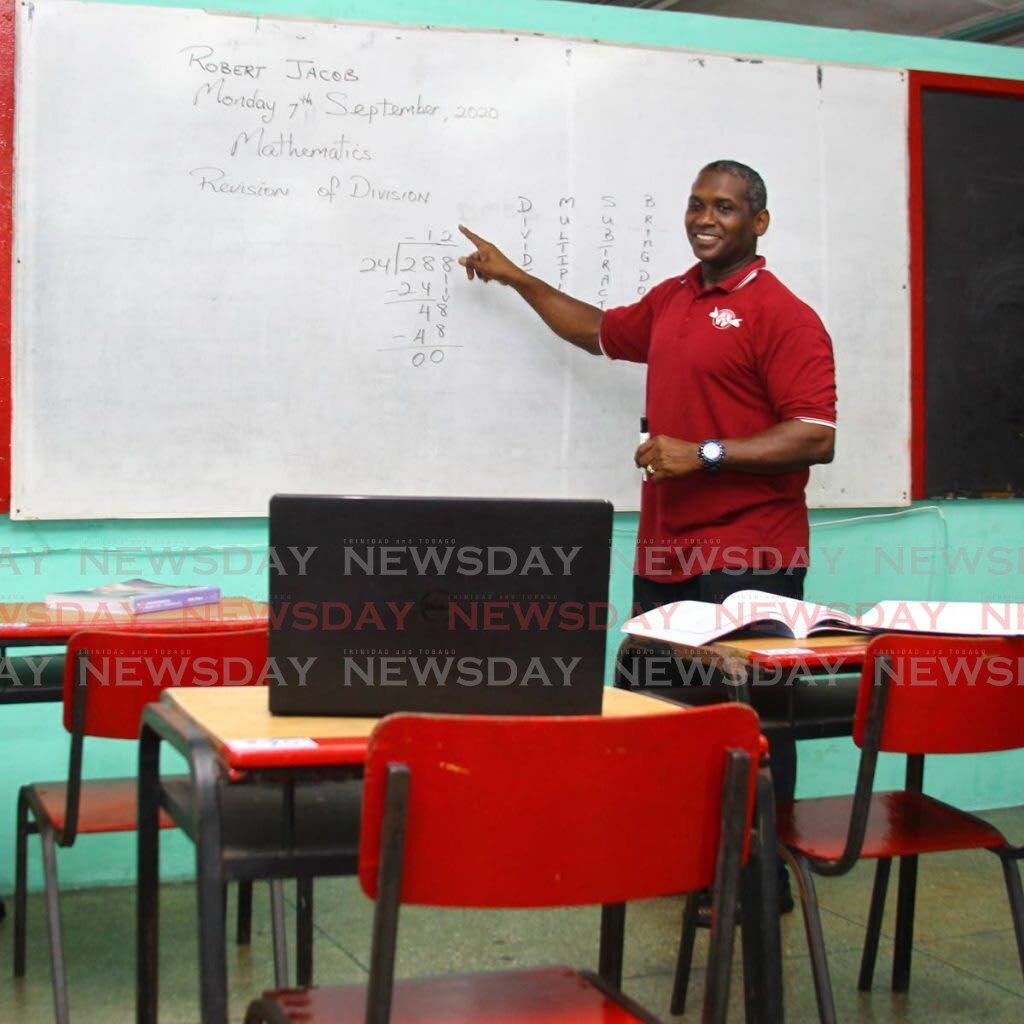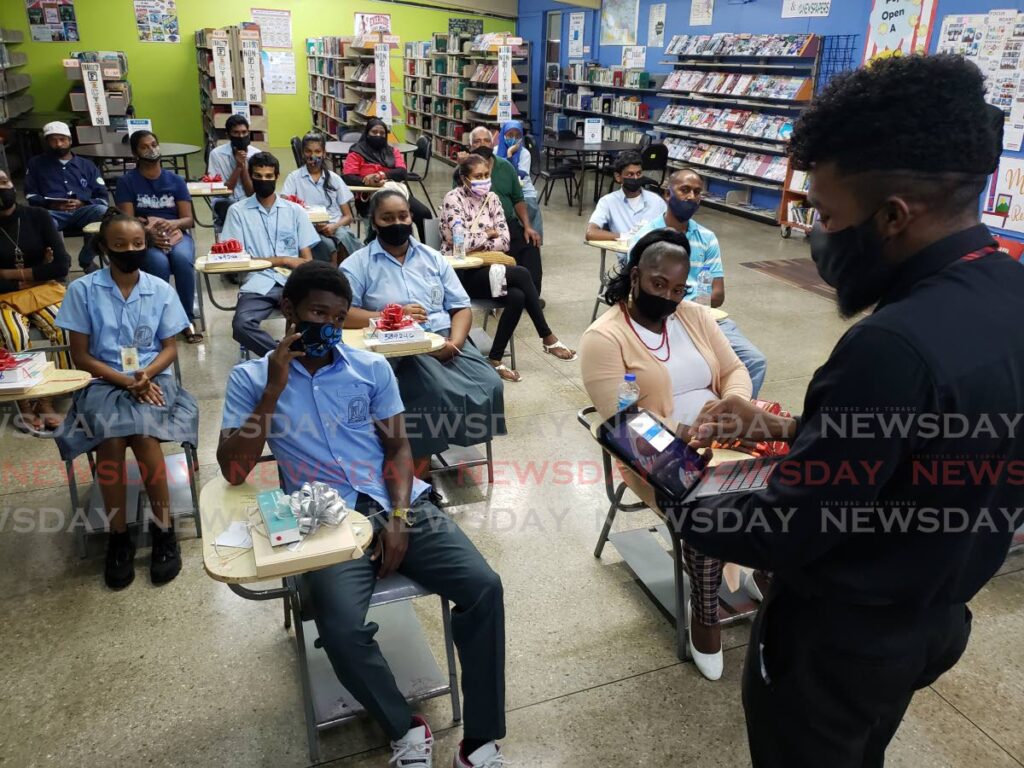Digital expert pundit Shiva Maharaj: Don't use internet as a babysitter

Protecting your online presence has become critically important as technology evolves and expands, and it not only relies on cyber security applications to do so, but also an awareness of the do’s and don’ts of simple internet usage.
In his effort to raise awareness, father, educator, "digital guru" and pundit Shiva Maharaj has for over 15 years undertaken the task of promoting safe internet use for all age groups, especially children, that he interacts with personally and professionally.
Maharaj, the owner of ICT Expertz Ltd, spoke with Business Day on Tuesday, Safer Internet Day (SID), about the negatives and positives that the world wide web and technology have on society.
SID was introduced in 2004 by the EU SafeBorders project and to date transcends in over 180 countries.
In Trinidad and Tobago, the local arm is spearheaded by Maharaj and his company which has also been promoting National Cyber Security Awareness month and Data Privacy Day.
SID was observed globally on February 8, and its theme was "together for a better internet" with an objective to have all stakeholders collaborate for a safer internet for all, especially children and young people.
Maharaj, who is also a primary school teacher at the El Dorado North Hindu Primary, and a lecturer at the University of TT for the master's programme in educational technology, said management of time online was critical for positive development and to prevent online addiction in children.

His concern stemmed from the shift to online classrooms owing the covid19 pandemic which forced the shutdown of physical schooling for almost two years. On Monday, forms 1-3 students returned to physical classrooms on a rotational basis, and forms 4-6 students physically attended school from February to July and October to December in 2021, and are doing so in the first term of 2022.
“It is not just about using it properly but knowing how to balance the time spent online and when to log off so that they do not become addicted. There should be set times for school, entertainment, and outdoor recreational activities.
“Adults tend to use the internet as a type of babysitter and while I understand how hectic parenting can be, prolonged online use for a developing mind has its disadvantages.”
He said striking a balance for both parents and children required awareness of the negative and positive outcomes of the internet and suggested that both parties enter a technology contract within their household.
Maharaj explained, “A technology contract where the parents sit with their children and discuss what are some of the uses they are allowed technology for, and together they come up with punishments for any breaches. It is an open and healthy discussion with the child to encourage responsible behaviour.”
He said parents as well as teachers need to also be aware of the various options afforded by their service provider.
Sharing his own run-in with an unwanted site, lewd images or pornography sites for example, Maharaj said blocking or restricting such sites were simple and adults should have open discussions with children about the dangers of those sites.
“All internet providers and all modems come with parental controls, but many people don’t know because not even the internet providers telling parents that. It’s free, it’s there and you are paying for it.
“When the child come across inappropriate sites the first thing, they should do is alert the parents or a trusted adult so that they can have a conversation with the child about it and why it should not be accessed. This also gives the parents an opportunity to prevent similar occurrences from taking place.
“Be careful of free sites because free access to some sites have malware and things that will actually harm your system or device.”

On the topic of social media sites, Maharaj said too often people continue to make the simple mistake of posting details of their personal lives that could be used against them by hackers and criminals.
He pointed out that while the sites such as Facebook, Instagram, TikTok, Twitter and others were meant for entertainment and to keep in contact with people, users should be mindful of their posts.
“Many people post pictures of their children in school uniforms with the school’s logos exposed thereby giving perpetrators access to their children. What school you child attends is private information. Posting pictures while on vacation leaves your home open to be vandalised and robbed.
“Geo-tagging is also something that many people are aware of and mindlessly post pictures that gives away their location, making them vulnerable to an unfortunate incident. These little things are taken for granted.”
Maharaj said with such minute details being unconsidered, cyber education needed to be a focus in schools from the primary level because that was where the future was headed.
He explained that the covid19 pandemic has exploited the use of, and need for a shift to online platforms for convenience, and safety was a key element of concern.
While many people were sceptical about conducting and engaging in online transactions and business ventures, he said the reality was that it was not as daunting if the right information was available.
“There are a lot of technophobia outside there and are afraid. There is a multitude of good and there is a multitude of bad. You just have to be aware of it.”
Maharaj said the individuals, government and private sector needed to recognise and understand that technology was here to stay and there must be awareness and practice of proper uses, protections, violations, and redress.
Looking ahead, Maharaj said more and more jobs were becoming online based and while there was thrust for digitisation, government also needed to consider more educational options for information technology.
“We need to include it in the school system. All the first world countries do so. They have things like digital citizenship, digital literacy included in the education system. We have absolutely nothing in our primary schools, officially from the Ministry of Education.
“At the tertiary level there needs to be a serious upgrade in educational and internet technology development. It is an area for job creation and development and more people recognising the opportunities that information technology brings.”
In promoting SID, the TT Police Service warned that unsupervised children with access to the internet are potentially at risk of online abuse and predators.
It listed "online challenges" as among the things that pop up on social media and virtual platforms, including viral stories, and digital ghost.
In 2019, there was a concern worldwide about the appearance of of a grotesque avatar called Momo in popular online teen and children's video games that seemed to promote suicide with dangerous challenges.

"The challenges themselves can vary but often encourage individuals to harm themselves, others, or property in the real world. They are often created to cause alarm and have been designed to seem enticing or exciting for young people," the police said of such challenges.
And just as Maharaj advises, the police also encouraged parents and guardians to discusses these issues with their children and set parent controls on their children's devices.
The police said reports of online abuse can be make to its hotlines 999, 555 or the TTPS app.
Shiva Maharaj as the 'digital guru'
Shiva Mahraj, as the owner of ICT Expertz Ltd, is a telecommunications engineer, has specialities in data communications and information communications technology, a diploma and advanced diploma in computer studies specialising in information technology support and e-commerce development from the UK’s NCC Education, and Computer Technology Industry Association (CompTIA) A+ and Network+ certifications.
Maharaj also has a bachelor's of education from UTT and a post-graduate degree, a master of arts in technical vocational education and training and workforce development.


Comments
"Digital expert pundit Shiva Maharaj: Don’t use internet as a babysitter"